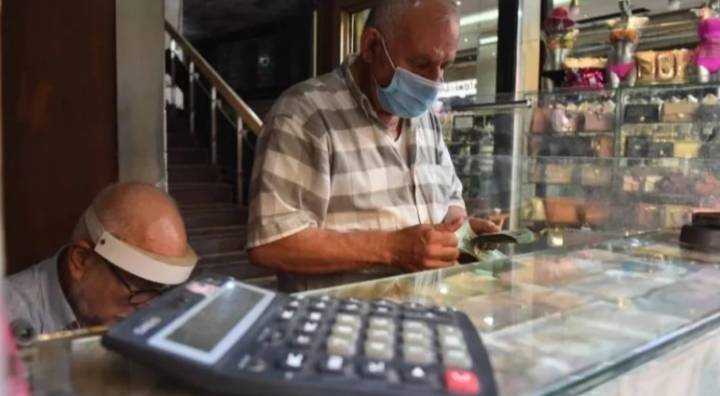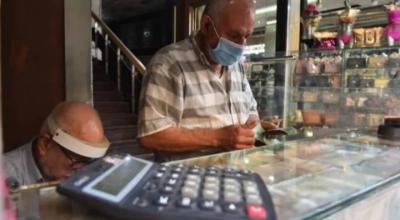The financial and monetary collapses, alongside the deepening cash economy, have led to the creation of a "banking lira," colloquially referred to as "beer," paralleling the dollar deposits that turned into "lollar." The lira deposits held in bank accounts are essentially missing, while those that are accessible through internal bank transfers or checks are subjected to deductions ranging from 12 to 20 percent. The insistence of monetary policy to obscure the lira deposits in Lebanese banks is allowing for the creative use of newly printed liras, resulting in grave risks to the economic situation and the possibility of restoring Lebanon's trust from the outside, according to MP Mark Dou. "The exacerbation of the cash economy will push foreign countries to further tighten their grip on Lebanon's financial and banking transactions and to take harsher measures that may not end even with the implementation of necessary reforms." Consequently, "we are obliged to invent a new mechanism to return the liras in bank accounts to the economic cycle," according to Dou, "in a way that encourages the use of the national currency in daily internal transactions without causing inflation due to the excessive expansion of the lira monetary mass."
#### Liberating Them Eases the Economy!
The deposits in Lebanese lira, amounting to about 38 trillion liras, remain to this day excluded from any plan for their retrieval. Apart from Circular 148 issued on April 3, 2020, which allowed owners of very small deposits, not exceeding 5 million liras, to convert them to dollars at the official rate and then withdraw them at the Sayrafa platform rate (2600 liras), these deposits are virtually considered hostage. "It does not seem that the capital control law in its final form will work to release them if it sees the light," according to Dou, "but rather will subject them to constraints similar to dollar accounts for fear of increasing the monetary mass in lira." Knowing that fully liberating them and imposing their use with non-cash payment methods would ease the economy and reduce pressure on many service and commercial institutions, the latter's accounts are trapped, and they cannot utilize the funds for the benefit of their customers or employees without paying a "fine" of up to 12 percent. Banks have imposed on companies to carry the liras resulting from sales transactions to their branches to meet the various obligations. Hence, companies preferred to avoid this dangerous mechanism and pay in cash to meet their needs, which requires logistical preparations related to security, protection, and cash storage.
#### Continued Printing Destroys Hope for Retrieving Deposits
The attempts led by the financial and monetary authorities to absorb the devalued liras remain too weak to permit the liberation of deposits in the national currency. The Central Bank was only able to absorb 12 trillion liras through opening unlimited transfers from lira to dollar on the Sayrafa platform from December 27, 2022, to January 9, 2023, where figures indicated a decrease in the monetary mass from 80 to 68 trillion liras. About 1.4 billion dollars were pumped into the Sayrafa platform for this "kamikaze" operation. However, the Finance Ministry's measures, which requested companies to pay 50 percent of customs duties in cash, also failed due to major objections against them. Therefore, "let us gather all monetary mass in lira, which includes cash in circulation and bank accounts, whether current or time deposits, and find a way to dissolve it within a timeframe ending before the year 2023." Printing money increases month by month, neglecting these accounts.
#### Practical Measures
Theoretically sound proposals must be accompanied by two basic practical measures, according to financial and banking advisor Dr. Ghassan Shamas, otherwise their consequences will be counterproductive, greatly increasing inflation and deepening the lira's collapse. The two measures are:
- The approval of the capital control law.
- Imposing quantitative and qualitative restrictions on imports from abroad.
Shamas explains his viewpoint based on a very clear equation: "All deposits, whether in dollars, euros, pounds, or even lira, no longer have a physical presence in banks; they are all merely banking records. To facilitate their liberation and thus the usage for non-cash payment methods like checks, a capital control law must exist. Without this law, banks will continue to refuse to accept paper checks for fear of being later required to convert them into cash, whether through Circular 158 or even through force and legal actions. Consequently, the money entering as a bank check under capital control could exit as a check from the other side, reducing internal transfers to mere records and thus shrinking cash trading opportunities." However, in the end, this money can be divided into two parts: the first will cover internal costs, which can be fulfilled through non-cash transactions or even via digital lira. The second will inevitably convert into actual cash for importing necessities from abroad, which the economy depends on by over 80 percent. Here arises the importance of quantitative and qualitative restrictions on imports.
#### Import Restrictions
At the end of this process, someone will import from abroad, and both lollar and lira will turn into real dollars to facilitate this operation. At this specific stage, "if the state commits to securing dollars in exchange for a part of the lollar or lira without exceeding a certain limit, 'the game opens up,' according to Shamas. "This means lifting restrictions on the liras and lollars in banks, allowing for a digital process and reviving the economy."
#### Possible Solution
Transitioning to digital currency, which helps liberate the trapped liras and even lollars, cannot occur before ensuring hard currency for imports in a controlled manner, unlike the current practice of the Central Bank in providing it to everyone who needs and does not need it, at a cost of up to 300 million dollars a day. "At the end of the economic cycle, at the point of import, dollars must be secured in a regulated and specified manner according to the actual needs of the country and at a market price that should become the sole price," according to Shamas. Implementing an import quota would alleviate the trade balance deficit, especially since Lebanon imports according to figures from two countries. Adding exports around 3.5 billion dollars, remittances from expatriates estimated at 7 billion dollars, tourism revenues that could reach 10 billion dollars, and some foreign investments... this process can adjust the balance of payments. With the elimination of the deficit in the balance of payments, inflation on the lira would automatically cease, and the need for continued dollar purchases from the market at the current crazy rate would disappear, thus stabilizing the exchange rate.
In contrast to the artificial method by which the dollar exchange rate was pegged based on borrowing over the past three decades, stimulating the economy could naturally restore stability to the exchange rate and eliminate issues related to varying exchange rates and blocked deposits. Ghassan Shamas considers the deposits in lira liberated, meaning they exist and can be paid whenever the central bank, which holds the sovereign authority over the national currency and the ability to print, wishes. Logically, there is no "capital control" on the national currency; rather, there are restrictions on usage by the central bank. Paying off the lira deposits would ease banks and relieve them of the burden of their sterile presence in their accounts, as banks do not benefit from these deposits either through lending or commissions.




